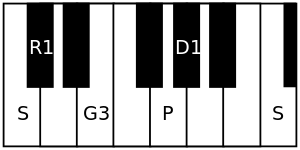Revagupti
| Carnatic music |
|---|
Tanjavur-style Tambura |
| Concepts |
| Compositions |
| Instruments |
|
Revagupti (pronounced rēvagupti) is a rāgam in Carnatic music (musical scale of South Indian classical music). It is a pentatonic scale (audava rāgam or owdava rāgam). It is a janya rāgam (derived scale), as it does not have all the seven swaras (musical notes).
It is a morning rāgam.[1][2] The similar scales in Hindustani music are Rewa and Bibhas.[2]
Structure and Lakshana

Revagupti is a symmetric rāgam that does not contain madhyamam or nishādham. It is a symmetric pentatonic scale (audava-audava ragam[1][2] in Carnatic music classification – audava meaning 'of 5'). Its ascending and descending scale (ārohaṇa-avarohaṇa structure) is as follows:
The notes used in this scale are shadjam, shuddha rishabham, antara gandharam, panchamam and shuddha dhaivatham, as per Carnatic music notation and terms for the swaras. Revagupti is considered a janya rāgam of Mayamalavagowla, the 15th Melakarta rāgam, though it can be derived from 5 other melakarta rāgams by dropping both the madhyamam and nishādham.
Popular Compositions
Here are a few songs composed in Revagupti.
- Griha bala memi composed by Tyagaraja
- Sada vinatu sadare by Muthuswami Dikshitar
- Ni vera ganidhi by Annamacharya
Related rāgams
This section covers the theoretical and scientific aspect of this rāgam.
Scale similarities
- Bhupalam rāgam differs from Revagupti only by the gāndhāram. It uses sadharana gāndhāram instead of antara gāndhāram and its ārohaṇa-avarohaṇa structure is S R1 G2 P D1 S : S D1 P G2 R1 S[1][2]
- Bhauli rāgam uses an additional nishadam in descending scale, in comparison to Revagupti. Its ārohaṇa-avarohaṇa structure is S R1 G3 P D1 S : S N3 D1 P G3 R1 S[2]
- Karnataka Shuddha Saveri rāgam uses shuddha madhyamam in place of antara gandharam of Revagupti. Its ārohaṇa-avarohaṇa structure is S R1 M1 P D1 S : S D1 P M1 R1 S
References
- 1 2 3 Ragas in Carnatic music by Dr. S. Bhagyalekshmy, Pub. 1990, CBH Publications
- 1 2 3 4 5 Raganidhi by P. Subba Rao, Pub. 1964, The Music Academy of Madras